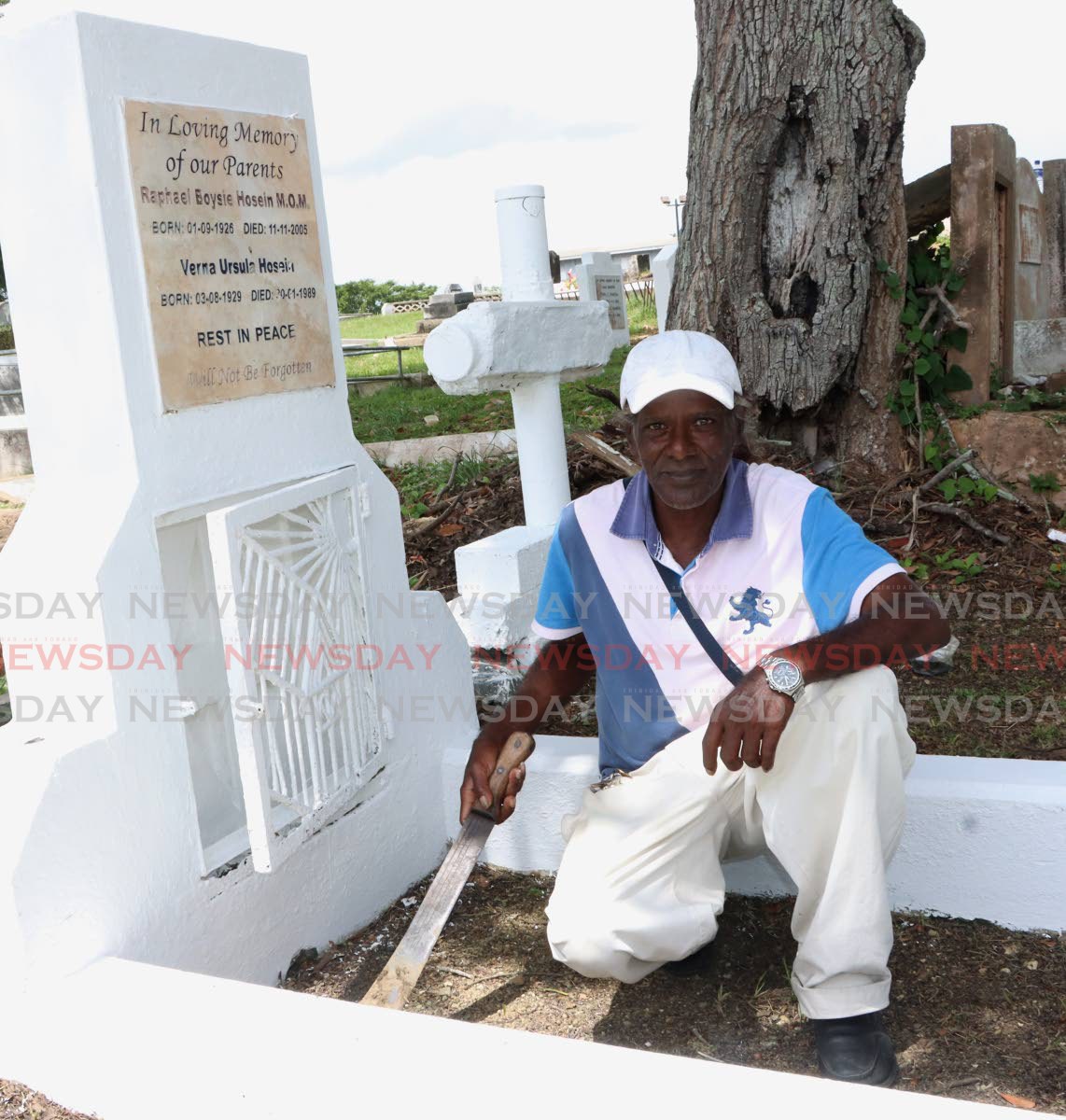For over four decades, Khalid “Monan” Ghany has transformed a simple teenage hustle into a profound vocation, dedicating his life to cleaning and decorating gravesites at Paradise Cemetery in San Fernando, Trinidad and Tobago. What began as a modest effort to earn a little money has evolved into a deeply respected service, bringing comfort and pride to families during the sacred observances of All Saints’ Day and All Souls’ Day. These annual traditions, observed on November 1 and 2, respectively, hold immense significance for the Roman Catholic community, as families gather to honor their departed loved ones by cleaning graves, painting tombstones, and adorning them with flowers and candles. Monan’s role in this cultural ritual has made him an indispensable figure in the community. ‘We come to paint and clean the graves. This here what we do is a hustle – we come to look for a little money,’ Monan shared with a humble grin. Yet, his work has long surpassed a mere hustle. Over the years, he has cultivated a loyal clientele, including prominent families like the Kalicharans, Jaqui Koon How, the Samlalsinghs, and the Boodosinghs, who trust him year after year to care for their loved ones’ resting places. Monan’s dedication extends beyond his clients; he also takes pride in maintaining the graves of Trinidad and Tobago’s cultural icons, such as calypsonians Roaring Lion, Black Stalin, and Ras Shorty I. ‘These men are icons for Trinidad and Tobago. Oh gosh alyuh, clean up the grave nah man,’ he urged. For Monan, this tradition is not just about upkeep but about preserving memory, respect, and continuity. He fondly recalls the vibrant celebrations of the past, when families filled the cemetery with life and light. ‘Long time, the same thing yuh seeing now but much more people. Families would come during the day, lime and pay respect. In the night, they’d come back, light candles, talk, and laugh. The whole cemetery used to shine bright with candles,’ he reminisced. Today, the scene is quieter, but Monan’s devotion remains unwavering. As dusk falls on another All Saints and All Souls season, Monan stands at the heart of Paradise Cemetery, brush in hand, embodying a legacy of faith, love, and remembrance.
博客
-

Lessons from Melissa: Prepare for natural disasters
In the wake of Hurricane Melissa’s catastrophic impact across the Caribbean, disaster management experts are emphasizing the urgent need for enhanced preparedness and infrastructure improvements in vulnerable regions. Jerry David, a senior disaster management coordinator at Trinidad and Tobago’s Ministry of Rural Development and Local Government, highlighted the critical vulnerabilities in the country’s flood-prone areas, particularly the Caroni plains and the Oropouche river basins. He stressed that while natural hazards are inevitable, human actions and inadequate planning often escalate them into full-blown disasters. David pointed out that improper construction practices, such as building settlements on hillsides and using substandard roofing materials, exacerbate the risks during hurricanes. He also lamented the lack of designated shelters in Trinidad and Tobago, urging for better-equipped community centers and schools to serve as safe havens during emergencies. The aftermath of Hurricane Melissa, which struck Jamaica as a Category 5 storm and later hit Cuba as a Category 3, has left a trail of destruction, with at least 19 fatalities in Jamaica, widespread power outages, and thousands displaced. International aid agencies, including the Red Cross and the UN, have mobilized extensive relief efforts, delivering essential supplies and support to affected regions. David emphasized the importance of studying Melissa’s impact to refine disaster response strategies and improve future preparedness. The hurricane’s devastation has also sparked a broader conversation about the need for proactive measures, such as proper tree pruning, reinforced infrastructure, and community education, to mitigate the effects of future natural disasters.
-
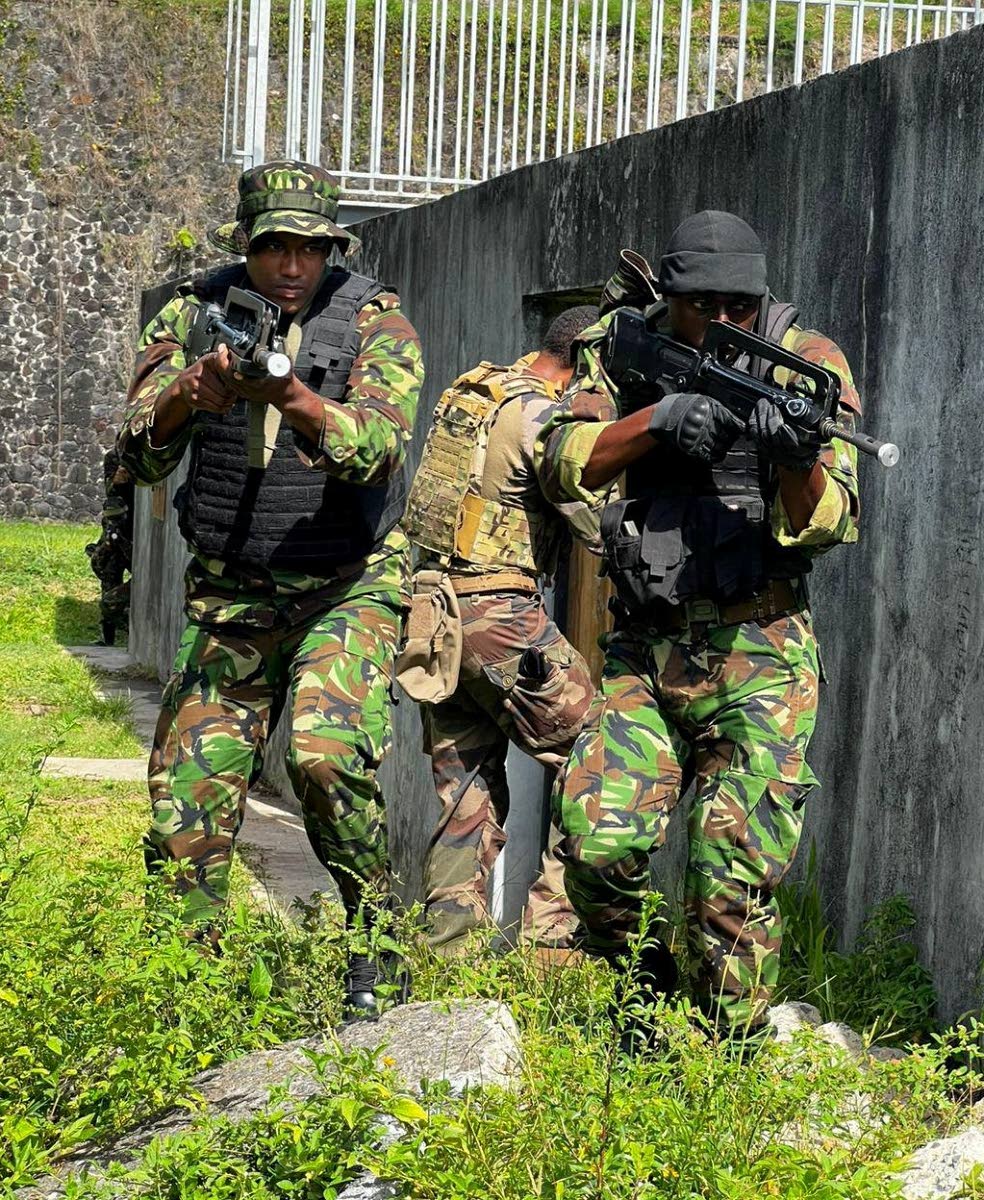
Military devise ‘war’ plans after call-out – Troops stand down
In response to escalating tensions between the United States and Venezuela, military commanders have developed three specific contingency plans to address potential land strikes involving US forces. This strategic preparation follows the mandatory recall of thousands of active-duty soldiers, sailors, and personnel on October 31, who were instructed to report for duty by 6 pm, leading to a lockdown of all military installations. Although the heightened alert was deactivated later that night, three Quick Reaction Force (QRF) teams remain deployed to strategic locations as part of an ongoing operation to monitor the situation. A senior military officer confirmed that these measures are in place to respond to any emergency arising from military actions in Venezuela. The call to duty was reportedly prompted by international media reports suggesting the US was preparing to strike Venezuela, a claim later refuted by US President Donald Trump and the White House. Trump has previously authorized CIA covert operations in Venezuela and recently announced plans to target drug-related activities within the country. The combination of these developments, along with parliamentary debates on extending the state of emergency, has caused widespread anxiety, leading to early school closures and business shutdowns. Prime Minister Kamla Persad-Bissessar has urged calm, pledging to keep the public informed of significant developments. She has supported US military strikes against narco-traffickers, which have resulted in 61 deaths over the past eight weeks. Military personnel responded promptly to the call, filling camps across the country, while senior commanders convened to assess operational intelligence and devise strategies to handle potential threats, including the migration of Venezuelan nationals fleeing conflict zones. ‘We have a responsibility to care for them while ensuring the safety of our own population,’ an officer stated.
-
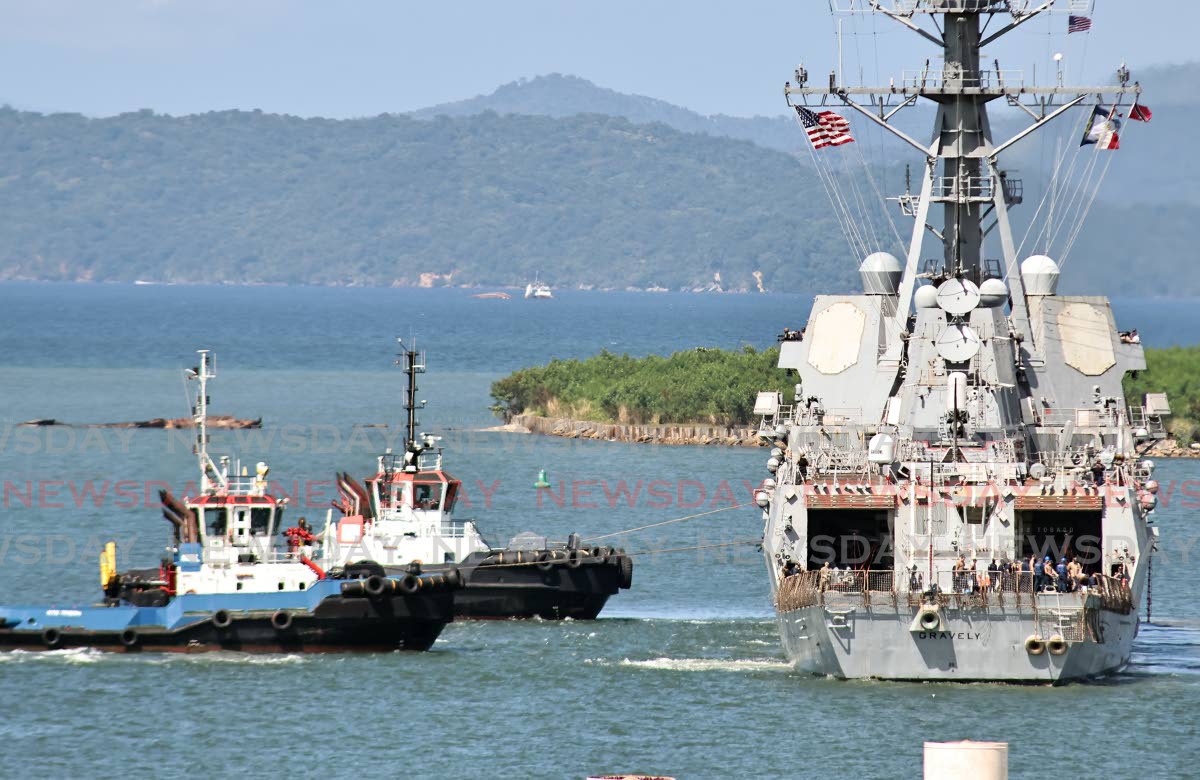
International relations expert: Trinidad and Tobago, Venezuela relations could get worse
The recent visit of the USS Gravely, an American warship destroyer, to the Port of Spain has sparked significant controversy and heightened tensions between Trinidad and Tobago (TT) and Venezuela. The vessel departed on October 30 after a five-day humanitarian and training mission, but its presence has been interpreted by the Venezuelan government as a military provocation, threatening regional peace. This development comes amid Prime Minister Kamla Persad-Bissessar’s aggressive stance against Venezuelan drug cartels, which has drawn criticism from international relations experts and human rights advocates. Dr. Anthony Gonzales, a prominent international relations expert, has openly disagreed with Persad-Bissessar’s support for US military actions that have resulted in the deaths of 61 suspected narco-traffickers. Gonzales emphasized the importance of due process, echoing concerns raised by the United Nations Commissioner for Human Rights, Volker Türk, who condemned the extrajudicial killings. Persad-Bissessar, who returned to power after the UNC-led coalition’s victory in the April 28 general election, has declared a zero-tolerance policy toward drug traffickers, stating, “I have no sympathy for traffickers, the US military should kill them all, violently.” However, Gonzales criticized her contradictory statements, noting her opposition to a Venezuelan invasion while advocating for lethal measures against traffickers. He also questioned the timing of the USS Gravely’s visit, suggesting it could escalate tensions with Venezuela. The Venezuelan National Assembly’s decision to declare Persad-Bissessar persona non grata and suspend energy cooperation with TT has further strained bilateral relations. Historian Dr. Jerome Teelucksingh warned that these developments could have severe economic repercussions for TT, particularly affecting the tourism and energy sectors. While he supports Persad-Bissessar’s efforts to combat drug cartels, Teelucksingh expressed concern about the long-term impact of severed energy agreements, including the loss of the Dragon Gas deal. Both experts agree that TT must navigate this delicate situation carefully to avoid being drawn into a broader conflict.
-
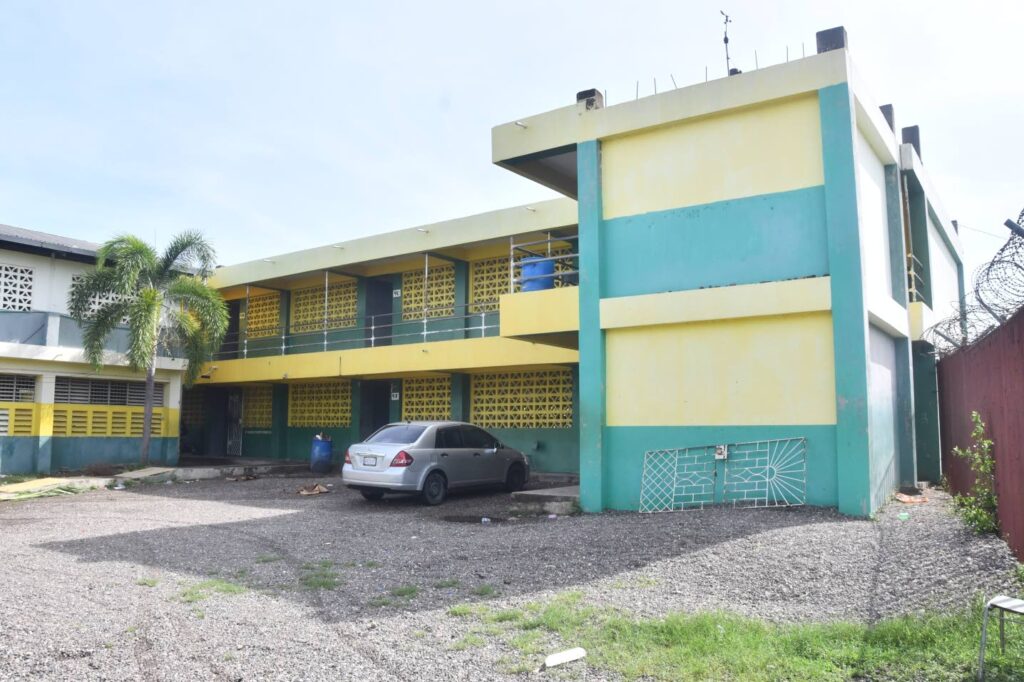
JTA president urges caution in planned reopening of some schools
The aftermath of Hurricane Melissa has left Jamaica grappling with the challenge of reopening schools, sparking a heated debate between the Jamaica Teachers’ Association (JTA) and the Ministry of Education. JTA President Mark Malabver expressed deep concerns over the ministry’s directive for schools in less-affected parishes to resume operations on November 3. Malabver argued that such decisions should be made at the institutional level, involving principals, teachers, and stakeholders, rather than adopting a blanket approach. He emphasized the need to consider the personal circumstances of educators, many of whom have suffered significant losses, including homes and family members, and are struggling with mental health issues.
-
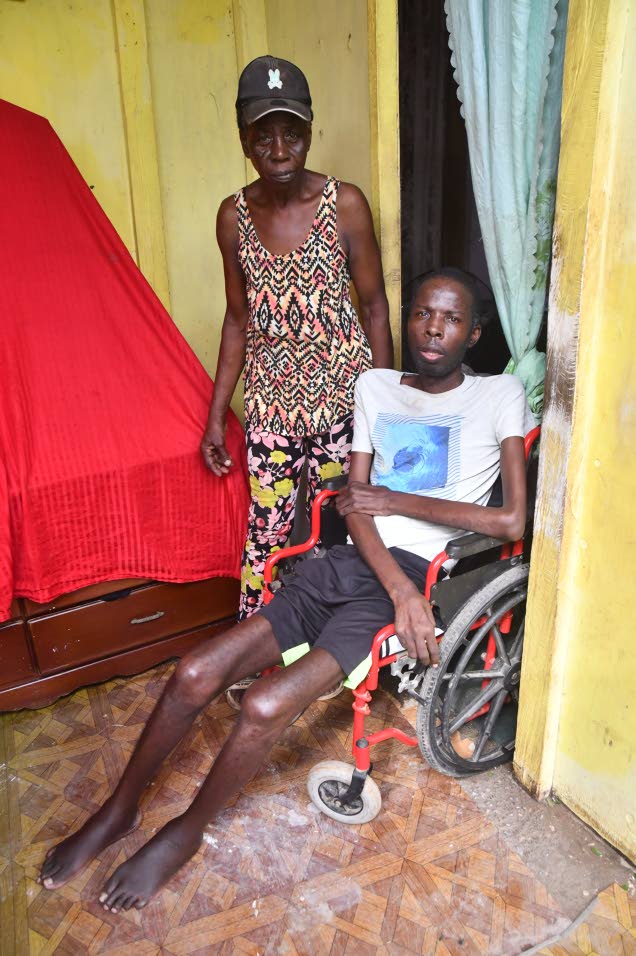
‘You can get back a roof, but not a life
As Hurricane Melissa ravaged Jamaica with winds reaching 185 miles per hour, Vera Brown, a 65-year-old single mother, faced the storm with unwavering determination. Her four adult children, all wheelchair-bound due to an undiagnosed condition, relied on her strength and prayers as the Category 5 hurricane tore through their home in Royal Palm, St Ann. Despite the roof being partially ripped off and the surrounding houses flattened, Brown remained grateful that her family was safe. ‘You can rebuild a roof, but you can’t get back a life,’ she told the Jamaica Observer, emphasizing her priority: her children’s survival. Brown, who suffers from chronic back pain, single-handedly carried her children to safety, a testament to her resilience. Her daughter, Norneth Jarrett, recounted the fear and trauma of the storm, highlighting their vulnerability as a family with physical challenges. The hurricane claimed 19 lives in Jamaica, and the family now appeals for assistance to repair their home and replace lost essentials. Despite their hardships, they remain thankful for their survival, attributing it to divine mercy.
-
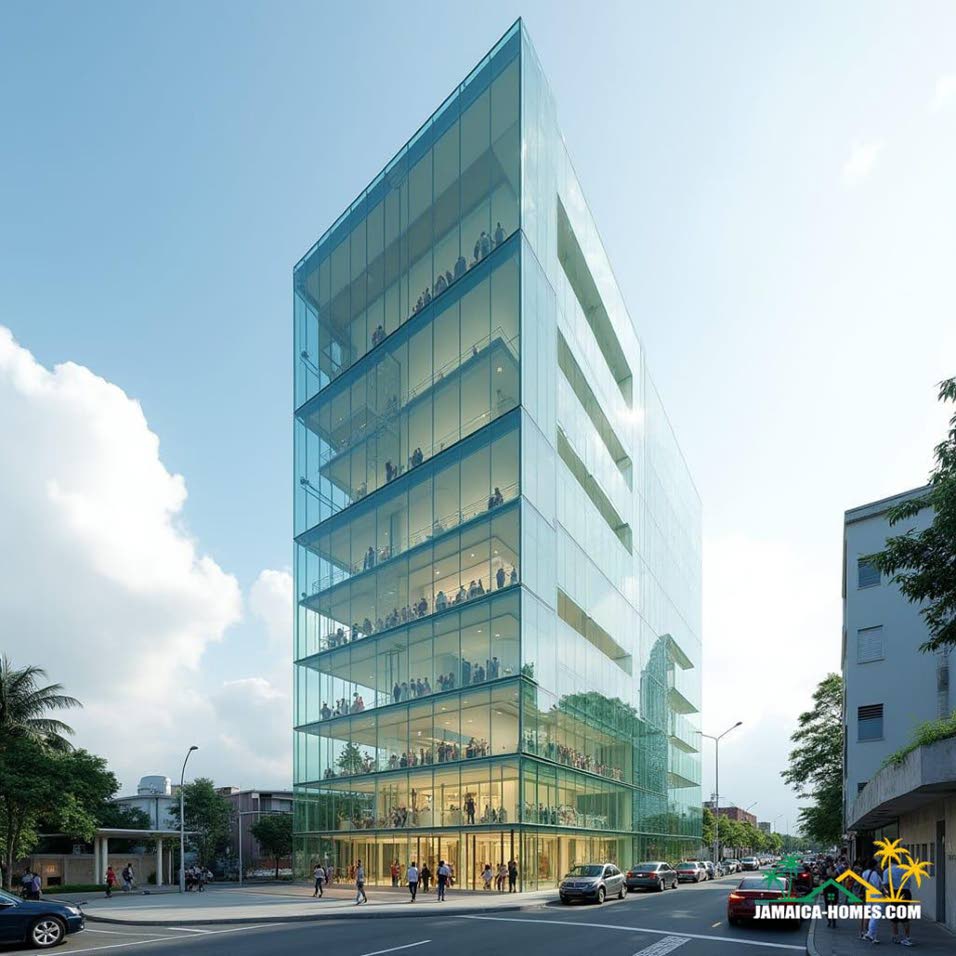
A house that breathes
In Jamaica, architecture transcends mere shelter, embodying a cultural ethos that celebrates community, resilience, and vibrant living. Traditional designs, with their expansive verandas, thick walls, and bold colors, have long reflected the island’s spirit. However, as Jamaica faces modern challenges—scarce land, harsher weather, and technological advancements—the need for a reimagined architectural approach has never been more urgent. This article explores a vision for the future of Jamaican architecture, one that harmonizes tradition with innovation, sustainability, and inclusivity. The foundation of this vision lies in listening to the land. Historical homes, designed with tall ceilings, deep eaves, and natural ventilation, offer timeless lessons in comfort and climate adaptation. Modern designs must build on these principles, incorporating features like storm-resistant roofs, rainwater harvesting systems, and thermally efficient materials. Vertical living, a necessity in growing cities, should retain the essence of traditional low-rise homes, with balconies functioning as verandas and rooftops serving as communal spaces. Resilience is paramount in an era of increasing hurricanes and rising sea levels. Coastal homes must respect the environment, stepping back from the shoreline and integrating natural barriers like mangroves. Technology, when thoughtfully integrated, can enhance comfort and efficiency, from smart shutters that respond to weather conditions to energy storage systems that ensure uninterrupted power. Affordability and dignity must be central to housing solutions. Thoughtful designs that cater to diverse family needs, coupled with mixed-income developments that foster inclusivity, are essential. Jamaican architecture should also embrace its unique identity, using local materials like limestone and timber, and reinterpreting traditional elements like breeze blocks and verandas in contemporary ways. Public spaces must be welcoming and accessible, designed for all ages and abilities. Sustainability should be foundational, not an afterthought, with designs that prioritize passive cooling, water conservation, and local materials. The home itself must adapt to modern lifestyles, offering flexible spaces that accommodate work, rest, and play. Craftsmanship and local labor should be celebrated, embedding economic value into every structure. This vision calls for collaboration among architects, policymakers, builders, and communities to create a built environment that reflects Jamaica’s resilience, warmth, and identity. By building wisely and inclusively, Jamaica can craft a future where architecture not only shelters but also strengthens its people and culture.
-
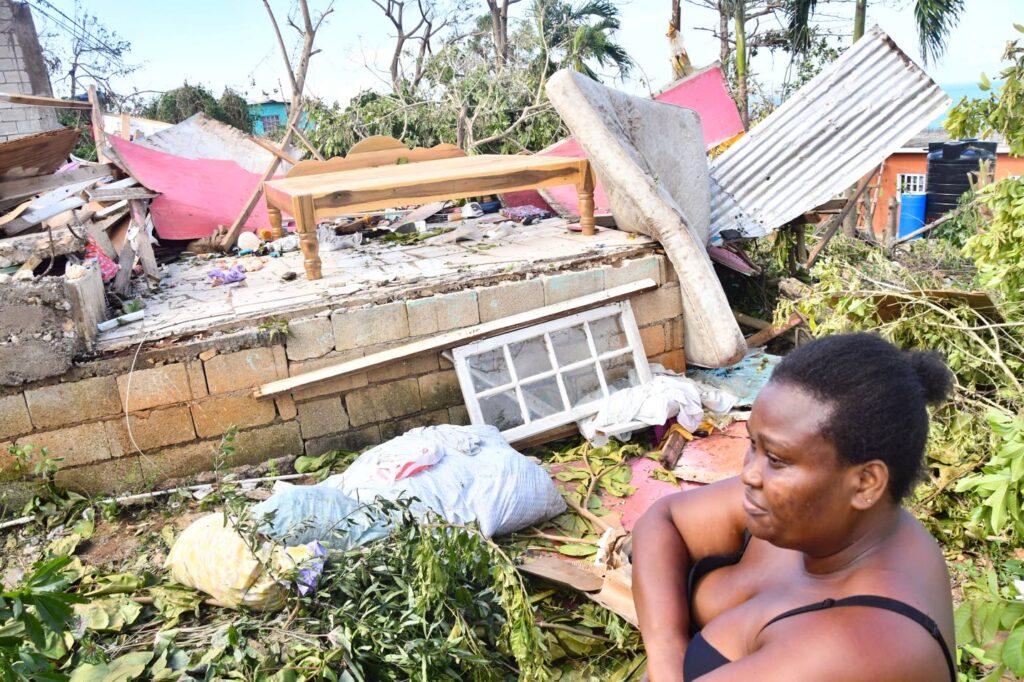
Only four suits of hotel uniform
Allison Alexander, a hotel bar attendant in St Ann, Jamaica, faced unimaginable devastation as Hurricane Melissa, a Category 5 storm, flattened her home while she was tending to tourists. Now, she and her seven-year-old daughter are among the countless Jamaicans left homeless by the disaster. Alexander’s home, a two-bedroom wooden structure, was completely destroyed, with a fallen tree crushing its walls and scattering her belongings. Despite her personal loss, Alexander remained dedicated to her job, ensuring the safety and comfort of hotel guests throughout the storm. She shared her harrowing story with the Jamaica Observer, revealing that she and her daughter now have nothing but the clothes on their backs. The hotel provided temporary shelter for staff and their families during the hurricane, but Alexander is uncertain about her next steps as the arrangement is set to end. She expressed frustration over the inadequacy of her minimum wage salary, which she says is insufficient to rebuild her life. Prime Minister Andrew Holness has pledged to increase the national minimum wage, but for Alexander, the immediate need for shelter and basic necessities remains urgent. She has appealed for help, stating, ‘If anybody can help me, please, I am begging you. I don’t have anything.’
-

Calendarise remote learning for continuity in crisis
The COVID-19 pandemic was not merely a global health crisis; it fundamentally transformed the landscape of education. As classrooms emptied and screens became the new learning hubs, teaching and learning underwent a dramatic redefinition. From makeshift roadside schoolrooms to teachers delivering materials door-to-door, the pandemic forced a rapid shift to remote education. For those with access to digital devices and the internet, online learning became an academic lifeline. However, the crisis also exposed the stark digital divide in many countries, highlighting the challenges faced by students and educators in underserved communities.
-
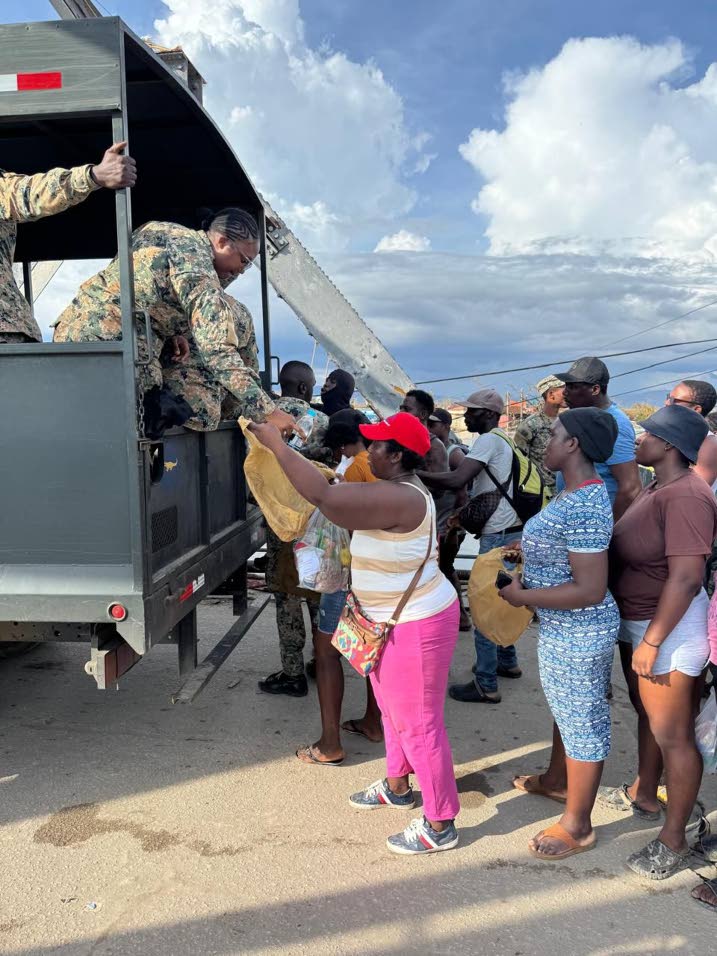
Recovery in full gear
In response to the devastating impact of Hurricane Melissa, the Jamaican government has unveiled plans to establish multiple field hospitals across the island as the death toll rises to 28. The Category 5 storm, which struck last Tuesday, severely damaged healthcare facilities in western Jamaica, prompting urgent measures to address the crisis. Health and Wellness Minister Dr. Christopher Tufton announced during a media briefing on Saturday that the first field hospital will be constructed in Black River, St. Elizabeth, with assistance from the international humanitarian organization Samaritan’s Purse. The facility, equipped with an operating theater and critical diagnostic equipment, is expected to begin operations on Sunday, November 2. Additional field hospitals will be set up in Savanna-la-mar, Falmouth, Noel Holmes, and Cornwall Regional. The Indian, Canadian, and Spanish governments have also pledged support by providing field hospitals. Meanwhile, the Ministry of Labour and Social Security, in collaboration with humanitarian partners, has distributed essential supplies such as food, water, and care packages to patients and staff at Black River Hospital. International aid continues to pour in, with the World Food Programme delivering 5,000 food kits to feed 15,000 people for a week and the Dominican Republic sending a Navy vessel loaded with over 1,050,000 food rations and other relief supplies. Local Government Minister Desmond McKenzie reported significant progress in clearing major roads, including the reopening of the Class A road from Kingston to Lucea and the southern route from Santa Cruz to Black River. Additionally, the Jamaica Public Service Company has restored electricity to 150,000 customers across several parishes. The Jamaica Defence Force has also been actively involved, delivering relief packages to affected communities in Black River.
